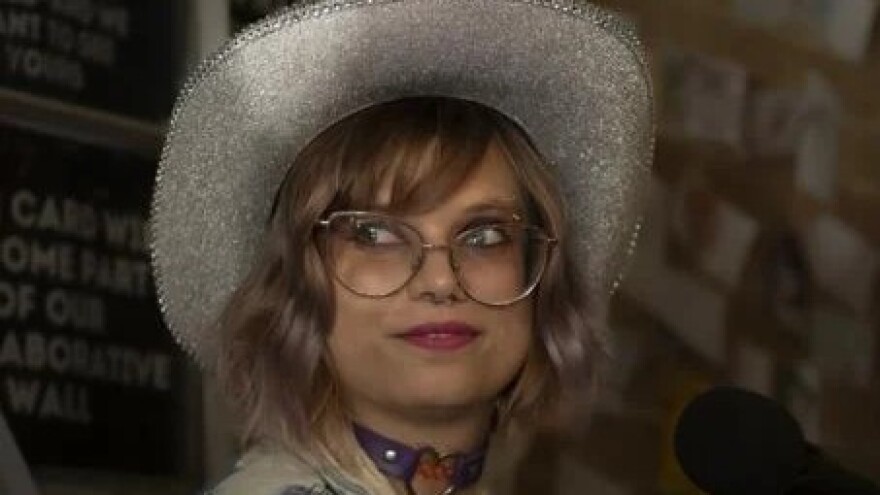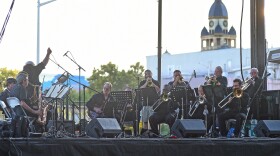Disabilities and chronic illnesses, many of them considered invisible, were on display for a fashion show earlier this month in Denton.
July is nationally recognized as Disability Pride Month, a time to celebrate and recognize individuals who live with disabilities. Communities across the United States plan parades, panels and other events to acknowledge the month’s importance and honor the work of disability activists. In Denton, local organizers worked together to plan several events over the past couple of weeks to celebrate the disabled community.
Over 50 people crowded into the cozy space inside Bramblitt’s Yellow Dog Art Bar & Gallery for a disability-centered fashion show July 12.
On the runway, a dozen wearable pieces designed by Denton artist and activist Emily Cavender mainly represented invisible disabilities — disabilities and conditions that are not always visible to onlookers but can be physically, mentally and emotionally life-altering to the people living with them.
“This project began through grief,” Cavender said in her opening remarks. A recent University of North Texas graduate, she had to grapple with her own worsening health while completing her bachelor’s degree in art education. Because of her disabilities, the degree’s student-teaching requirement was inaccessible to Cavender, and she petitioned for an alternate way to fulfill the degree requirements.
“This project would not be in existence if it were not for [Trina Harlow],” Cavender said. The UNT faculty member’s support was essential, and what began as a single large fiber arts sculpture expanded into an entire collection that took on a life of its own.
The audience’s claps and cheers drowned out techno beats as models began to walk through the crowd to the stage. Showcasing a variety of different textiles, each piece represented a different part of the body as well as disabilities and illnesses related to those body parts.
Cavender intentionally selected models with the same disabilities as those represented in her art; the models in the show were not just displaying her masterpieces but also their own disabilities.
Max, a local massage therapist, modeled the explosive Spilling My Guts, a twisting mass of fabric intestines spilling from the lower abdomen, representing gastrointestinal disorders such as irritable bowel syndrome and Crohn’s disease.
Max recalled meeting Cavender for the first time and modeling the piece for photos and said, “I was very much silently going through a lot of GI pain and IBS.”
Seeing a physical representation of his pain and participating in Cavender’s project has also allowed him to make connections with people who are having similar struggles and experiences.
“Nobody wants to talk about their guts,” he said with a laugh, also recalling how modeling the piece helped him release a lot of stigma and shame associated with having an invisible illness.
“Society says not to talk about it,” he said.
For audience members — some of whom used wheelchairs, crutches and other mobility aids to sit or stand as they were able — the show created a space for conversations about difficult and unspoken experiences related to living with a disability or chronic condition.
After the show, the bar buzzed with excitement, laughter and new connections. Alexa Frederick loved how colorful the designs were and thought it was particularly meaningful for them to be presented on bodies rather than on a canvas.
“It adds a sense of meaning to it to visibly show it on the body, and it adds so many layers of meaning,” she said.
Many members of the audience and models alike spoke about one piece in particular as being their favorite. Titled Just Another Hysterical Woman and worn like a fanny pack around the waist, the piece features a large velvet uterus with octopus-like fallopian tentacles wrapping around the model’s legs and tying at the ankles. It represents endometriosis and other conditions that affect the uterus and reproductive organs.
Cavender created the piece to capture her own experiences living with endometriosis and to recognize the two-year anniversary of the overturning of Roe v. Wade.
She posted photos of the piece on Instagram alongside an accompanying poem and was shocked by the reaction. People who saw the piece connected to it in a variety of ways, whether through their own experiences with those conditions or their concerns about the political landscape.
“I realized this is bigger than me,” she said. “This is something people have been waiting for.”
People with disabilities are no strangers to waiting. They may wait months for a gap in a specialist’s schedule, days for critical test results, or with bated breath for insurance coverage decisions that may drastically alter their quality of life.
“We’re still going, and we’re still here. We’re not just going to be swept under the rug,” Cavender said.
Michelle Henderson, a survivor of esophageal cancer, shared that modeling Worthy Whisperer and expressing her pride as a disabled person felt “amazing.” Her particular piece resembles a large statement necklace, wrapping closely around the neck and extending down into a pair of pink ruffled vocal cords, forming a mouth.
Henderson’s cancer treatment and tracheotomy paralyzed her vocal cords, leaving her unable to speak above a whisper, but her presence filled the room as she strutted to the stage.
Cavender read aloud the statement that Henderson wrote to accompany “Worthy Whisperer,” describing how clapping, stomping and writing are all ways she amplifies her physical voice.
She smiled broadly and struck a pose as Cavender read the final lines: “I learned to be comfortable in the body that I’m now in, and I whisper words of wisdom and share my truth.”
The themes of embracing the limitations of living in a physical body and sharing the truth of those experiences are essential aspects of disability pride, and Henderson encouraged everyone present to continue that celebration.
“Our disability community must continue to amplify our voices and our words!”
Invisibly Visible will continue to be a part of the Denton community with a community exhibition at the UNT CoLab in September.
Disabled artists and writers who are interested in participating can send an artist statement and examples of work to invisiblyvisibleshow@gmail.com and follow @ominousoutlooks on Instagram for details and updates.
Bethany Weston is an adjunct instructor at Texas Woman’s University and freelance journalist. Her work has also been featured in the Dallas Observer.




